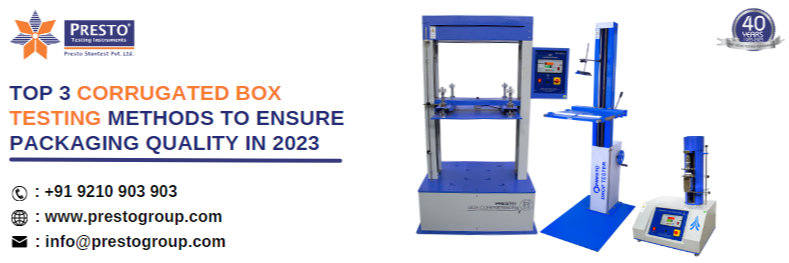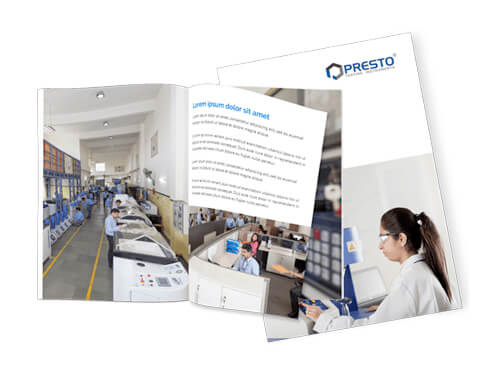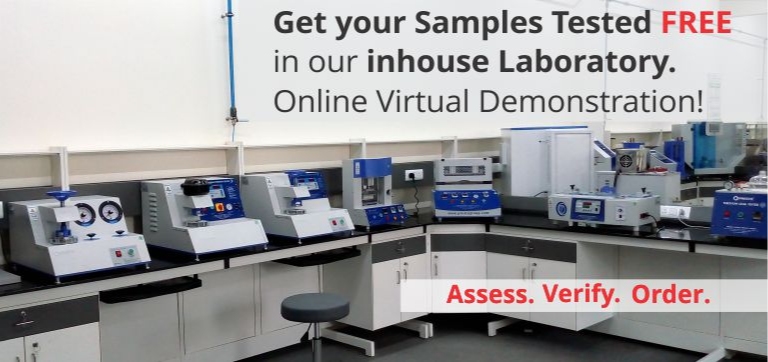We all know that packaging plays a crucial role in ensuring that the materials will be delivered safely. Corrugated boxes are commonly used in packaging due to their strength, durability, and versatility. Thus, testing the quality of these boxes is essential to ensure that the materials will not get deformed, crushed, or faces any type of damage during transportation and shipping. Thus, we at Presto have designed high-quality lab testing instruments for the paper & packaging industry that will help to test different factors of the boxes that make them quality material to deliver the products efficiently.
With the help of these paper & package testing instruments manufacturers and suppliers ensure that their products meet the required quality standards and specifications. Thus, if you are working in the paper & packaging industry, then these testing instruments will be a boon for your business.
In this blog post, we will explore the top three testing methods for optimal packaging quality in 2023. So buckle up and get ready for an insightful journey into the world of corrugated box strength and durability!
Introduction to Corrugated Box Strength and Durability
When it comes to protecting the contents inside the box during shipping, you want to make sure you have a durable and strong corrugated box. But how do you know if a particular corrugated box will be up to the best quality? Performing quality testing on these boxes with the help of the right lab testing instruments will help you to ensure that the right quality products will be delivered to the customers.
By conducting these tests, manufacturers can ensure that their corrugated boxes meet the required strength and durability standards, giving customers confidence in the protection of their goods during shipping and handling.
Now, let us discuss the top 3 methods for testing corrugated boxes accurately.
Top quality testing methods that you must use for corrugated box testing
Corrugated box testing is an important aspect of quality control, as it will help manufacturers in ensuring quality materials will be delivered to the customers. Without proper testing, there is a risk that the boxes may not be able to withstand the stresses of transportation, leading to damage or loss of the contents.
Thus, with the use of lab testing instruments, one can ensure that these boxes are fit for purpose, meet industry standards, and provide adequate protection for the products they contain.
Below we have listed the top 3 quality test methods for corrugated box testing.
The edge crush test (ECT) is a measure of the stacking strength of a corrugated box. It is performed by applying pressure to the corners of a small sample box until collapses. The amount of pressure required to crush the box is then divided by the box’s length to calculate its edge crush resistance.
The flat crush test (FCT) measures the compression strength of the flutes in a corrugated board. A small sample of corrugated board is placed on a platen and crushed until failure. The force required to do this is divided by the area of the sample to calculate its flat crush resistance
The ring crush test (RCT) measures both the edgewise compression strength of corrugated boards as well as adhesive bonding between liner boards and fluting. This test involves compressing a short, ring-shaped tube containing multiple layers of the corrugated board until it collapses.
To perform all these tests with the help of this quality testing equipment, manufacturers of the paper and packaging industry can make use of
Presto edge crush tester. This digital model has been made with quality standards including IS 7063. Its feather-touch controls and the bright LED digital display will provide the manufacturers with highly accurate lab testing results.
The drop test is considered to be an essential quality test method for corrugated box testing because it simulates the potential impact and shock that a box may experience during shipping and handling.
This quality test involves dropping a box from a predetermined height onto a hard surface and then evaluating the extent of any damage to the box and its contents.
This quality test measures the box's ability to absorb and dissipate the impact forces, which are critical in ensuring that the contents are protected during transportation.
Additionally, the drop test can help identify design or manufacturing flaws that may need to be addressed to improve the box's strength and durability. You can read about the
top 5 benefits of using a drop tester in corrugated box manufacturing.
We offer a both manual and
motorized pneumatic model of drop tester and ensures that quality products will be delivered to the customers. This
top-edge holding machine comes with adjustable height with zinc chromium coating for corrosion resistance.
Box compression testing is another essential quality test method for corrugated box testing. This test measures the maximum compressive force that a box can withstand before it fails, which is a critical indicator of the box's strength and durability. During this quality test, the box is placed between two compression plates and subjected to a steadily increasing force until it collapses or fails.
Box compression testing is crucial for determining the maximum weight that a box can safely hold and whether it meets industry standards for strength and durability. The results of the test can be used to optimize the box design and ensure that the materials used are appropriate for the intended use. You can easily
enhance your shipping with the use of a Presto box compression tester.
With these useful methods, one can easily test the quality of the materials and ensures that customers will not face any product rejections. To know more about
corrugated box testing instruments, you can give us a call at
+91 9210903903 or email us at
info@prestogroup.com. Our team of technical experts will consult you regarding all your needs and queries.




